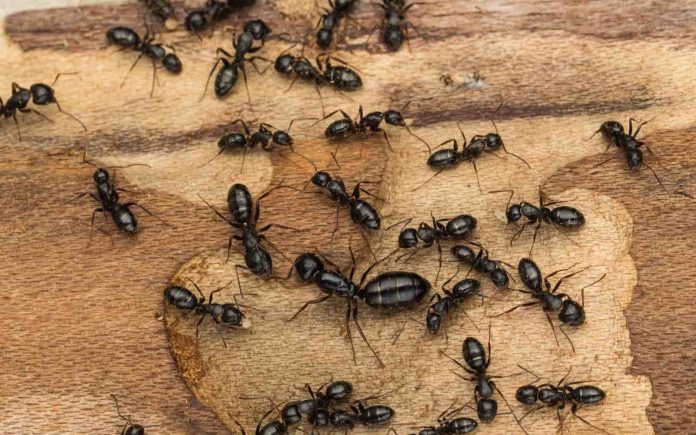Are you searching for a natural way to protect the wood in your home, shed, barn, and other outbuildings from carpenter ants without resorting to harsh chemicals? Carpenter ants can cause significant damage to wooden structures on your property. Unlike termites, they don’t eat wood but instead use it to build their nests and expand their colonies. As their population grows, so does the damage to the wood around your home and landscape.
While there are commercial powders and sprays available that can eliminate carpenter ant colonies, they can be concerning to use, especially around children, pets, and adults. However, there are several effective, safe, and 100% natural methods to control carpenter ants that eliminate the need for commercial products. Not only can these methods quickly take care of carpenter ants and the damage they cause, but they can also save you money in the process.
Understanding Carpenter Ants
Carpenter ants are named for their habit of building nests and carving tunnels in wooden structures. They don’t consume wood but rather use it to create nests and pathways. They chew through wood at a rapid pace, turning it into a sawdust-like substance. One of the first signs of carpenter ants is piles of wood remnants at the base of a structure.
In nature, carpenter ants play a vital role in breaking down old trees and stumps into humus. However, they also have an appetite for lumber, which can cause problems around homes and buildings.
Natural Methods to Stop Carpenter Ants
It’s important to control carpenter ants early on to prevent further damage. The longer a colony develops, the larger it becomes and the more damage it causes. Here are five simple and safe methods to stop carpenter ants naturally:
1. Soap & Water Spray
A mixture of all-natural liquid soap and water can be an effective and easy way to eliminate carpenter ants. This solution acts as a powerful insecticide that blocks the ants’ ability to receive oxygen and interferes with their respiratory system. To make the spray, mix three parts water with one part liquid soap. Spray the ants and affected areas thoroughly, focusing on entrances. Repeat daily for best results.
2. Baking Soda & Powdered Sugar
Baking soda is toxic to carpenter ants and can kill them quickly when ingested. Mixing equal parts of powdered sugar and baking soda creates an enticing bait for the ants. Place the mixture near the ant colony or along their paths. This method is particularly effective for eliminating small colonies.
3. Diatomaceous Earth
Diatomaceous earth is a natural powder made from fossilized algae. It has sharp edges that damage the exoskeleton of ants, causing them to dehydrate and perish. Sprinkle diatomaceous earth around the ant entrance and along their paths. Reapply after rain or when the powder becomes wet.
4. Vinegar
Vinegar can disrupt the pheromone trails that carpenter ants use to navigate. By mixing equal parts of store-bought vinegar with water, you can spray areas where the ants have been active. This method confuses and deters carpenter ants, preventing them from directing others to your wood surfaces.
5. Ground Cinnamon
Cinnamon works in two ways against ants. First, ants dislike the smell of cinnamon and will avoid it. Sprinkling cinnamon in front of their colony creates a barrier that they won’t cross. Second, the cinnamon dust they breathe is toxic to their respiratory system, incapacitating them. Use ground cinnamon to create a line in front of the ant colony.
Preventing Carpenter Ants
Prevention is key to stopping carpenter ants from infesting your property. Follow these tips to prevent carpenter ants:
- Fix moisture sources, such as leaking pipes.
- Repair or replace damaged wood.
- Store wood piles away from buildings.
- Plant peppermint, mint, and lavender around the edges of buildings, as ants dislike the scent.
By implementing these natural methods and prevention strategies, you can protect your home and structures from carpenter ant damage without relying on harsh chemicals.

